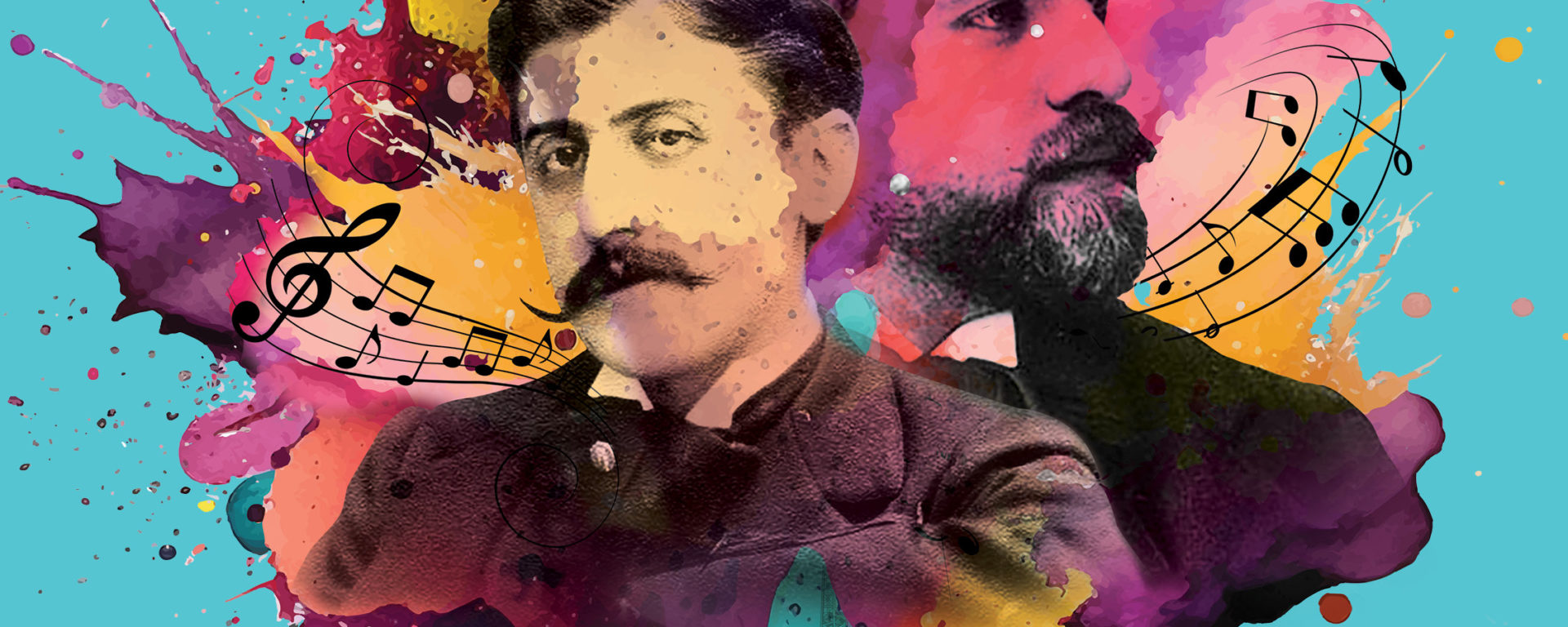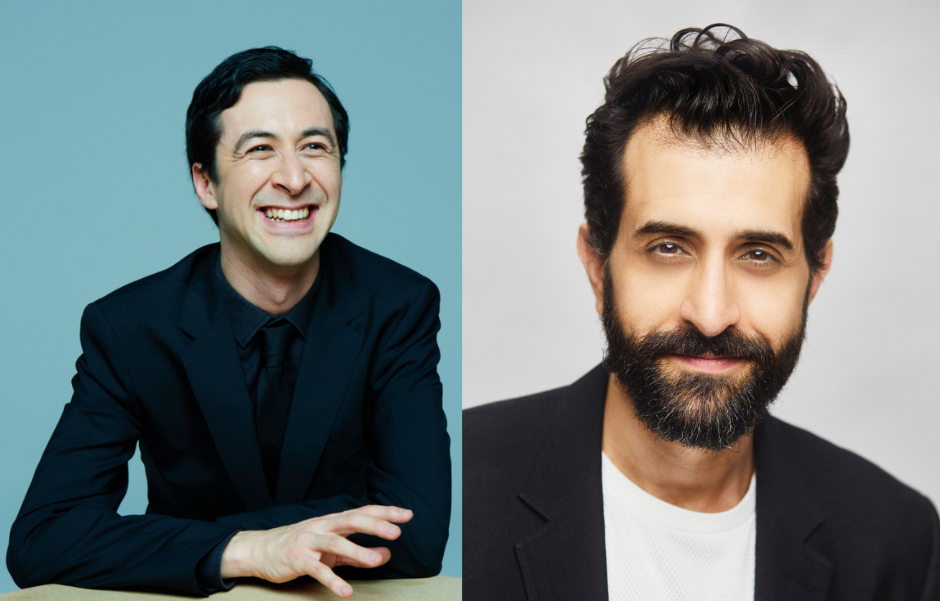
A Love Letter to Words and Music

With a programme including two never-before-heard arrangements by pianist-composer Tom Poster, the second of Kaleidoscope’s three performances in the 2023-24 season includes the new arrangements, taking its inspiration from the salons of Paris, the music of Reynaldo Hahn and the writings of Marcel Proust.
Kaleidoscope Chamber Collective has had a very successful few years, having released a series of acclaimed albums on Chandos Records, been appointed Associate Ensemble at Wigmore Hall, and debuted at the BBC Proms last summer.
Ahead of the concert, we sat down with pianist Tom Poster and tenor Karim Sulayman to learn more about In Search of Lost Love. Tom co-founded Kaleidoscope in 2017, and he performs at concert halls and festivals all over the world, as well as regularly featuring on BBC Radio 3. Karim won the 2019 Best Classical Solo Vocal GRAMMY® Award and regularly performs on the world’s stages in opera, orchestral concerts, recital and chamber music.

Kaleidoscope Chamber Collective will be returning to the Sheldonian Theatre for their concert In Search of Lost Love later this month. Where did the idea for the concert come from?
Tom: The initial inspiration came from a shared love for the exquisite music of Reynaldo Hahn, whose songs I was largely introduced to by Karim. Karim and I have performed the songs in their original voice and piano versions, and as a result I was inspired to expand them into brand-new chamber versions for voice, strings and piano. I think Karim has this wonderfully direct channel to Hahn’s music that I find incredibly touching.
I’ve also always been drawn to the salons of Paris around the turn of the 19th and 20th century. It seemed like a lovely thing to explore the world of the salons, the relationship between Proust and Hahn, and then to bring in some of the other composers who were writing around the time. It’s a very intoxicating world to be part of.
Karim, how were you first exposed to the music of Reynaldo Hahn?
Karim: When I was in school, I was always very drawn to French mélodie [the French equivalent of art song or Lieder]. I remember coming across a recording of Hahn playing and singing his own songs and, if you listened to it critically as a singer, you’d think that’s not the greatest voice you’ve ever heard, but there’s something so intimate and deeply touching when listening to him doing his own music. I think his music really pulls at the heart. Tom used the word intoxicating and that was exactly how I felt. I was completely intoxicated by listening to him playing and singing his own songs, so I started learning a bunch of them and they’ve stuck with me all these years. They’re deep and the expression of love in all of them is palpable, which I respond to, and I imagine audiences do as well.
The concert will feature the music of Reynaldo Hahn. What else can audiences expect from the programme?
Tom: It’s an evening which combines chamber music, song, and spoken word. The words are taken from the writings of both Marcel Proust and Reynaldo Hahn. Proust’s words come both from his published writings and from his beautiful letters to Hahn, Fauré and others. The texts by Hahn are drawn from some of his more general writings and lectures on music, but also from his letters to Proust. So, there’s this personal side too, which helps to open up the music even more.
We’ve performed a set of four Hahn songs in lots of places, but at the Oxford concert there will be two more which have never been performed or heard before in this chamber version: Le Rossignol des lilas and Chanson D’Automne. And Hahn’s Piano Quintet, which is the biggest piece in the concert, is simply one of the most beautiful works I know. From around the same time period, we’ve got Gabriel Fauré, and then two composers who deserve to be far better known than they are: Lili Boulanger, whose works are beginning to achieve greater recognition, and Mel Bonis, whose works are sadly still hardly ever played. Both had to struggle with the fact that composing was not seen as an appropriate vocation for a woman at the time. Finally, one of the features of the salons was not only featuring French music of the time, but also looking back to earlier French repertoire, so we have included some Baroque music as well, seen through an early 20th century lens.
This will be Kaleidoscope Chamber Collective’s second of three concerts in collaboration with Oxford’s Cultural Programme. Can you tell us a bit about your relationship with the Cultural Programme and the work that you’ve been doing together?
Tom: The collaboration with the Cultural Programme is an incredibly exciting thing for us. Quite a few musicians on the Kaleidoscope roster have strong links with Oxford, so that’s particularly lovely for us. I spent my teenage years in Oxford as a pupil at the Cherwell School, and was very much involved in the local music scene. I played in the County Youth Orchestra as a cellist and oboist, so Oxford played a huge part in my teenage musical development.
Savitri Grier, one of our wonderful violinists, was an undergraduate at Oxford University, and our violist Rosalind Ventris is now Director of Performance at Oxford. I think a lot of us have connections with Oxford from different parts of our lives, so the idea of working alongside both the University and the wider Oxford community sparked a lot of joy and inspiration. The first concert was amazing because it officially sold out and it just felt like the start of something really exciting. It feels like a very expansive, idealistic project, with all manner of fascinating collaborations to draw on, which for us is everything we could wish for!
Can you tell us more about the audience you hope to attract to this concert series?
Karim: This concert really is for everyone! If you look at the tradition of a salon evening, this music really was for the people in the room. Those were people of all walks of life and with different understandings of music. It was informal, people were smoking, talking and drinking wine. Then there would be a couple of songs and a joke – so we’ll try to crack some jokes too! People would respond to what it means to be in a room in such close proximity, making sounds with other people. The power of sharing sounds that come from inside your body is a very palpable and powerful experience.
Tom: It’s an ideal event for first time concert-goers as well as seasoned music lovers. There will be some spoken word, some songs, some instrumental music, and nothing is too long!
What do you hope audiences will take away from In Search of Lost Love?
Tom: I hope they’ll be inspired to go and seek out more of the music of these composers. Hahn especially, but really all the composers. In general, Kaleidoscope feels very passionate about performing music and composers that we feel don’t get the hearing they deserve. It’s not that we don’t want to perform Brahms and Schubert — we adore Brahms and Schubert, and we’ll always want to play them. But there are composers and music that are more in need of our advocacy, that don’t have the best quality recordings or the best quality editions. We hope to really infuse people with a love of music they might have not known before, because it’s honestly some of the most beautiful music on the planet!
